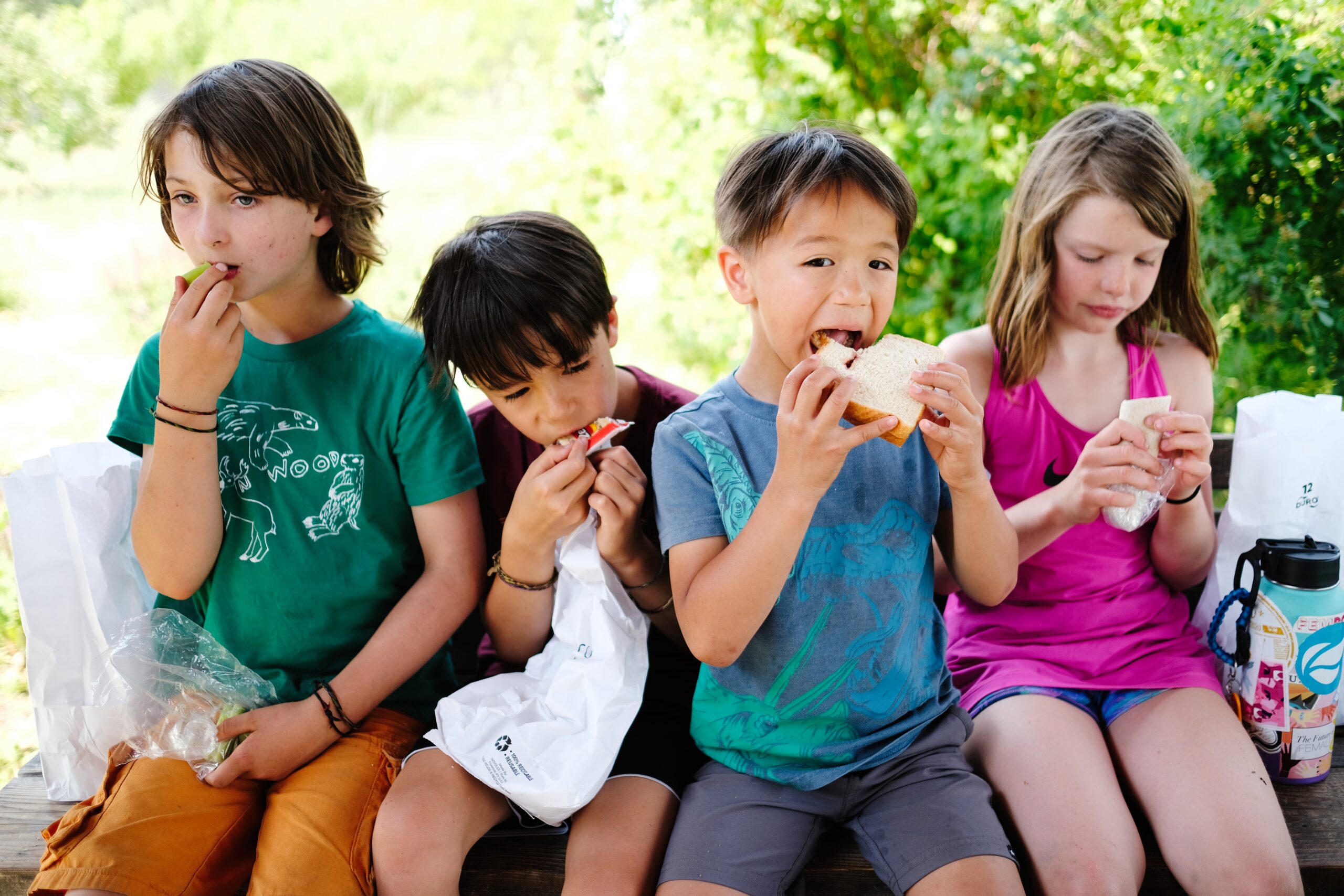Healthcare Partnerships
Like education, health care is a system that touches nearly all families, and as such, presents a compelling opportunity to broaden our reach beyond schools and community organizations. Our vision is to significantly increase meals available to children and their families by integrating nutrition assistance and food access into healthcare’s services and investments in social determinants of health.
For children living in households experiencing low income, higher rates of food insecurity, diet-related disease and the lack of access to affordable healthy food can cause immediate and long-term health challenges:
- Children and adolescents experiencing food insecurity are more likely to have overall worse general health. ( Thomas, M. M. C., Miller, D. P., & Morrissey, T. W. (2019). Food Insecurity and Child Health. Available at: https://publications.aap.org/pediatrics/article/144/4/e20190397/38475/Food-Insecurity-and-Child-Health ; Hartline-Grafton, H., Hassink, S.G. (2020). Food Insecurity and Health: Practices and Policies to Address Food Insecurity among Children. Available at: https://doi.org/10.1016/j.acap.2020.07.006 )
- Food insecurity in early childhood is associated with behavioral problems, anemia, and asthma at rates higher than those found among children who are food secure. Craig Gundersen & James P. Ziliak, Food Insecurity and Health Outcomes, 34 HEALTH AFFAIRS 1830 (2015), https://www.healthaffairs.org/doi/pdf/10.1377/hlthaff.2015.0645
- Food insecurity and malnutrition in childhood impacts health outcomes and presents an increased risk for disease in adulthood. (Victora, C. G. V., Adair, L., Fall, C., Hallal, P. C., Martorell, R., Richter, L., & Sachdev, H. S. (2008). Maternal and child undernutrition: consequences for adult health and human capital. Available at: https://www.thelancet.com/article/S0140-6736(07)61692-4/fulltext)
Informed by a comprehensive landscape analysis and learning from pilot projects, No Kid Hungry’s current and future health strategies work centers on reaching kids and families at risk of hunger by focusing on three Medicaid health systems: (1) Managed Care Organizations; (2) Networks of School-Based Health Centers; and (3) State-Level Medicaid Managed Care Contract Procurement and Clinical Quality Improvement Strategies.
The Medicaid Food Security Network is a group of healthcare and food security stakeholders, mobilizing Medicaid systems to become a key partner in addressing food and nutrition insecurity.
Participants in The Network engage, influence, and partner with state Medicaid programs and Medicaid-serving systems (Managed Care Organizations and providers) to adopt and implement effective strategies to support the food needs of children and families enrolled in Medicaid, with an emphasis on closing the enrollment gap in SNAP and WIC.
To learn more, visit our website.

Join The Network

Medicaid Food Security Partners Program
The BICC initiative aims to address childhood food insecurity by integrating nutrition benefit enrollment into Medicaid-serving health systems. This effort builds on existing Care Coordination screening and referral processes to improve access to SNAP and WIC.
The BICC initiative is funding partner organizations to strengthen their care coordination systems by streamlining enrollment in SNAP and WIC for Medicaid-enrolled children and families by:
- Enhancing benefits outreach and navigation
- Improving data interoperability, tracking, and reporting
Learn more about the goals of the initiative and partnering organizations HERE
Together with our SBHC partners, we are working to:
- Integrate food access into health center services and workflows, including screening, referral, and improved connection of families to federal nutrition programs (SNAP, WIC, School Meals, Summer Meals).
- Improve food security for youth and their families, improve dietary health, and connection to preventative care offered by the SBHCs.
- Identify and disseminate best practices for training and supporting SBHCs in addressing food insecurity through learning cohorts, toolkits, and technical assistance.
- Scale and replicate successful food access models across state networks of SBHCs, while prioritizing local community needs and incorporating youth voice and engagement.
Our SBHC Learning Cohorts:
Pilot SBHC Food Security Learning Network
In 2022, Share Our Strength and SBHA launched a pilot learning network and grant opportunity supporting integration of food and nutrition assistance access in school-based health center settings. The learning network included 16 school-based health centers across 12 states (GA, MD, LA, WV, AR, MI, WA, NY, IL, CO, OH, and FL). A summary of the impact and learnings from this original cohort can be found here: Summary one-pager.
Statewide SBHC Food Access Innovations and Learning Network
In July 2023, SBHA and NKH launched a learning network of two State Affiliates—the Ohio School-Based Health Alliance and Youth Healthcare Alliance (YHA) of Colorado—to support them in creating food access learning networks in their own states, which launched in Fall 2023. The Ohio SBHA selected 12 sites, and YHA selected 10 sites. SBHA and NKH are supporting their efforts to generate more impact at the state and local levels.
Resources
The Emerging Models and Resources to Address Food Insecurity Toolkit was launched in Spring 2023. It is an evergreen resource, intended to support SBHCs in the critical work of ending childhood hunger in their communities by compiling collective learnings and complementary best practices for addressing food insecurity in SBHCs. By offering real-world examples along with tools and materials developed by SBHC learning network grantees, the toolkit seeks to support other SBHCs with tangible resources.
The Addressing Food Insecurity in School-Based Health Centers: Practical Tips and Resources for Effective Interventions resource is intended to support school-based health center (SBHC) staff in their efforts to identify and address hunger by connecting youth and families with federal nutrition programs and local food resources. No Kid Hungry has partnered with the School-Based Health Alliance to pilot and uplift promising models that SBHCs can adopt. This tip sheet provides a starting point for SBHCs interested in beginning or expanding these efforts. You can find more information about this initiative and a companion toolkit here.
Innovative partnerships with Medicaid Managed Care Organizations - insurance providers - to increase access to meals and federal nutrition programs for families.
Nutrition in Housing
Working alongside Medicaid Managed Care Organizations (such as UnitedHealthcare), affordable housing developers, and community-based organizations, we are improving the food environment in four communities in California, Texas and Georgia. The goal was to establish a sustainable and replicable model to support food security for families with children in affordable housing communities. The model was piloted in four apartment sites: Cleme Manor (Houston, TX), Savannah Gardens (Savannah, GA), Esperanza Crossing (Esparto, CA), and Gleason Park (Stockton, CA). Utilizing a community involved process, the Nutrition in Housing model helped to improve the food environment by co-creating replicable pathways for benefits access (SNAP-EBT) and food access via food delivery programs.
Share Our Strength- No Kid Hungry is thrilled to unveil the findings of our Nutrition in Housing (NIH) pilot evaluation through this micro report. Collaborating with Mercy Housing and NHP Foundation, two of the nation's leading affordable housing organizations, this report showcases the impactful outcomes across three key areas: enhancing food environments, boosting SNAP enrollment and utilization, and improving overall health and well-being. The pilot included innovative strategies such as food delivery initiatives with Instacart Health Fresh Funds and Little Red Box, support for SNAP/EBT enrollment, afterschool youth programs focused on nutrition, community gardens, adult nutrition classes, food pantry expansions including emergency services, and enhanced partnerships with local farmers markets.
Share Our Strength thanks Instacart, which generously supported our collaboration with our California sites with a philanthropic investment.
Healthy Families Produce Rx
Healthy Families Produce Rx (HFPRx) is an innovative food access program for Medicaid enrollees, developed in partnership with Aetna Better Health of Louisiana, Share Our Strength’s No Kid Hungry campaign, Vouchers for Veggies, and LSU Ag Center. With funding from the USDA’s Gus Schumacher Nutrition Incentive Grant Program (GusNIP) the program will provide eligible families in six rural Louisiana parishes with $40 per month to purchase fresh fruits and vegetables at select local farmers markets and grocery retailers. The goal of the program is to improve dietary health and food security for families in these communities who are disproportionately impacted by poor nutrition and related health outcomes.
Existing models and external resources available to connect children and their families with healthy food access through integration with healthcare services
Healthcare settings have increasingly become venues where food insecurity and other social determinants of health needs are identified. However, addressing patients’ social needs in a consistent and sustainable way has proved challenging. Patients experiencing food insecurity may be referred to federal nutrition programs or other local food access programs (such as a local food pantry). A variety of referral systems, food resources and funding mechanisms have emerged to meet patient food needs. Some existing models include:
American Academy of Pediatrics and The Food Research & Action Center. (2021). Screen and Intervene: A Toolkit for Pediatricians to Address Food Insecurity. Available at: https://frac.org/aaptoolkit
Feed to Heal
Cambridge Health Alliance’s “Feed to Heal” project is an initiative initially created during the height of the COVID-19 pandemic to connect quarantining food-insecure patients with free, contactless food delivery. Seeing the potential for this referral model beyond quarantine, Feed to Heal got to work building out a technology-based system that deepens collaborations between healthcare systems and community food organizations with the goal of connecting patients, providers, health care systems, and food pantries.
Learn more about Feed to Heal’s successes connecting families with meals and other food supports in this case study.
Rural Produce Rx Toolkit and Learning Cohort
Produce prescription interventions have been popular as a means for addressing nutrition insecurity. Unfortunately, most of these interventions have been piloted in urban areas, thus the collective learning captured in resources meant to help communities adopt and scale these practices largely leave out key considerations that make the application of such models useful in rural areas.
Grounded in the belief that produce prescription programs should be uniquely tailored to meet the specific needs of each community, No Kid Hungry partnered with Vouchers 4 Veggies to research and develop a toolkit focused on implementing programs in rural areas. By sharing strategies and lessons learned from produce prescription programs operating in rural areas across the country, this toolkit identifies specific ways to utilize community strengths and assets to address the unique challenges often faced by produce prescription program operators in rural communities.
In 2022, No Kid Hungry granted nearly $500,000 to 10 rural produce prescription to implement programs utilizing the toolkit and access to a learning cohort over an 18-month period. Goals of the learning cohort included:
- Addressing the key challenges that established rural produce Rx programs report facing in community-based capacity and funding
- Strengthening and scaling rural clinical-community partnerships’ capacity to connect families with food and nutrition programs
- Helping rural produce Rx programs increase food resources available to families
- Expanding the reach of established rural produce Rx programs via effective practices
- Helping rural produce Rx programs to develop local strategies for project sustainability
A list of the grantee organizations is included below:
Rural Clinic and Community Food Access Innovations Cohort
This learning cohort was part of a pilot effort to test emerging strategies that leverage the potential of health care settings and systems to expand access to food and to nutrition programs for families. The ultimate goal of this learning community was to provide tested clinical-community food access interventions that are locally sustainable and that can be leveraged in other rural areas to address food needs of families before hunger becomes a crisis. These partnerships were supported with a two-year grant (January 2021- December 2022) from NKH to engage in a community-centered approach to increase access to food through produce RX and voucher programs in cooperation with local health clinics.
Learn more about cohort projects here.


